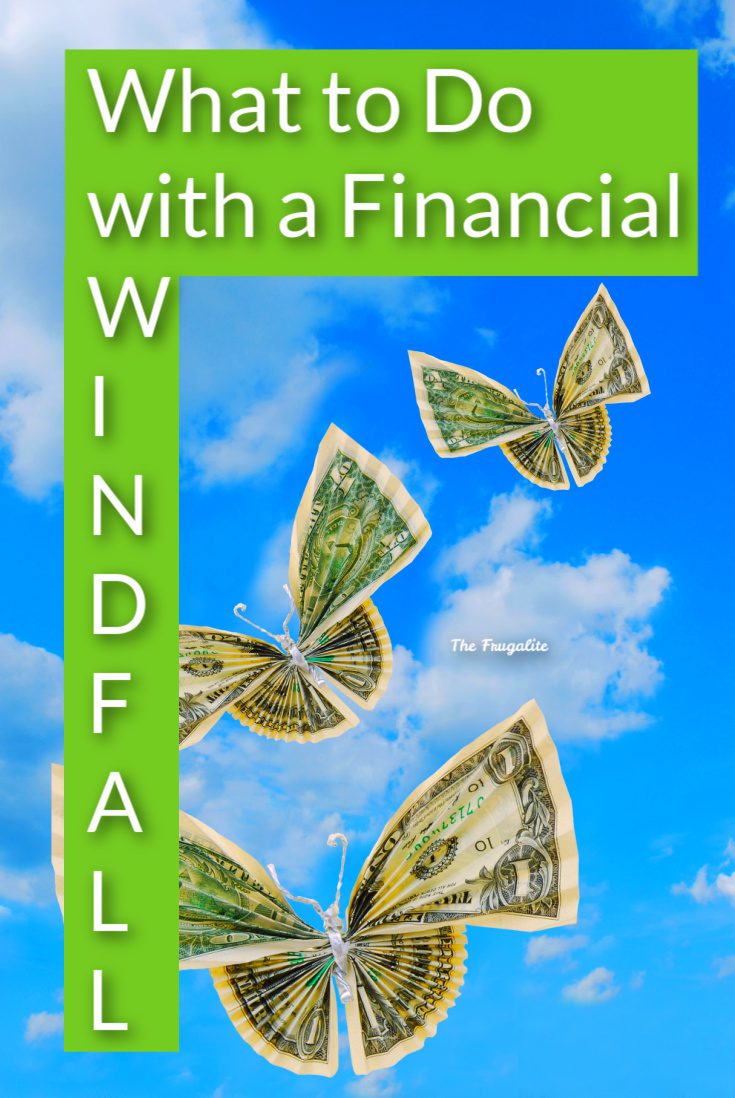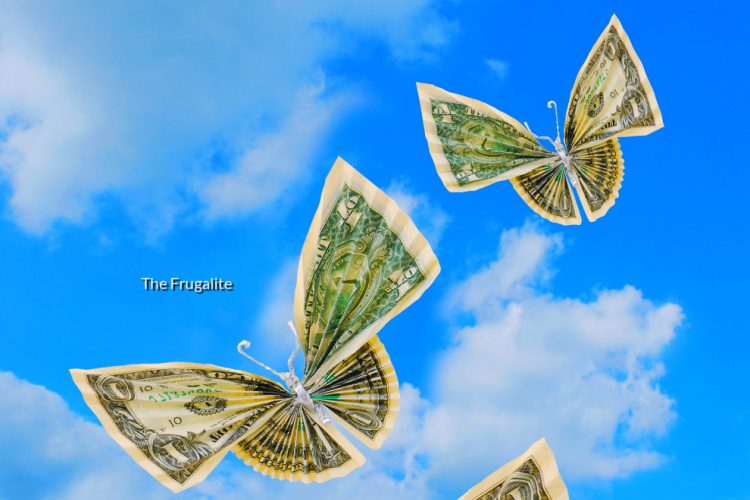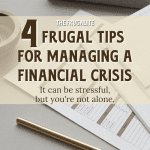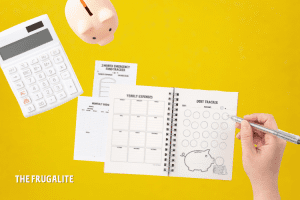(Psst: The FTC wants me to remind you that this website contains affiliate links. That means if you make a purchase from a link you click on, I might receive a small commission. This does not increase the price you’ll pay for that item nor does it decrease the awesomeness of the item. ~ Daisy)
Don’t you love it when money “falls from the sky?” That’s what I always call it when I receive a financial windfall. Money falling from the sky.
It could be a really hefty tax return, a gift, or the sale of some pricey item that has been just sitting around collecting dust. But wherever it comes from, the choice is still the same.
What should I do with all this money!?!?!?!?
Now, it’s human nature to splurge and buy all those things you’ve been denying yourself in your quest to be the Frugalest Frugalite in all the Galaxy. New clothes, beautiful furniture, a piece of jewelry – after all, you deserve a treat!
But not so fast.
You’ve also been working at paying off debt, building an emergency fund, etc. etc. et cetera. That little dose of reality was kind of a bummer, huh? Like a bucket of ice water splashed all over your celebratory plans?
Trust me when I tell you that many windfalls have slipped through my fingers in the past and I have sincerely regretted it. I don’t want you to regret it, so learn from my mistakes back in my spendy days!
Here’s the financial windfall plan.
First, don’t do anything immediately. You are going to feel so bad if you go and blow the entire financial windfall on a new living room set and then the bills come in and you wish you had paid off your credit card instead.
Then, break it up by percentages. My usual split is 10/50/40. Here’s the breakdown:
10%:
Put aside a percentage of the financial windfall for fun stuff. For me, it’s usually 10% and with that money, I can buy anything I want, no matter how frivolous.
One of my favorite ways to spend “free” money is on an adventure. I’m more into experiences than “stuff” these days, especially after selling nearly everything I owned. The kids will remember that time you went to the mountains a lot more fondly than that time you bought them yet another video game.
And I’m serious about this. Unless you are in the direst of straits, enjoy life a little bit. Frugality doesn’t mean you never, ever do or purchase anything fun and you just grimly pay off bills and then sock away cash until you die.
50%:
Add some to your emergency fund. I usually add 50% of any windfall straight into the fund. There have been so many times that I’ve been glad to have an emergency fund. It’s saved my bacon at least 20 times that I can think of right off the top of my head.
40%:
Then there are a couple of options for the remaining 40%.
- Check your snowball list. (You know, the one where you’re paying off all your debt.) Are there some small debts you can get rid of completely?
- Is there a bulk purchase you’ve been wanting to make? One that would save you a fair bit of money if you could pay for it all upfront? A side of beef or your car insurance for the next 6 months?
- Is there a repair you’ve been putting off? Most repairs, whether they are to cars or homes, save you more money in the long run. If you wait, you risk other systems being affected by the broken item. Then, when it completely fails and you have no choice but to repair it, your bill is far higher. Put new tires on the car, get that rattle-y refrigerator fixed, or patch that leak on the roof.
Don’t feel guilty.
Those are just my examples. You’re free, of course, to split this up however you want. But – and this may be surprising – I strongly urge you to put aside a little bit of money for fun. You work hard and you deserve a treat now and then. Having a little bit extra to enjoy from time to time will help you to stay motivated. You aren’t a Spartan and life is about living. Just don’t go overboard and blow the whole chunk of money!
Sometimes it can be difficult to switch from uber-frugality to a splurge without feeling guilty. If that’s the case, you need to think about your relationship with money.
Just like emotional overspending isn’t healthy, guilt about enjoyable spending isn’t healthy either. I have found that guilt is especially prevalent if I’ve gone through an extended period of very hard times.
If you find yourself in that situation, then your splurge might be something that others would consider practical that you haven’t been able to afford. Perhaps steak instead of hamburger meat, a meal out, or some snack foods you wouldn’t normally purchase. It could mean some new shoes for work even though your old ones are still hanging on. Perhaps you’ll be more comfortable spending 5% instead of 10%
What would you do with an unexpected financial windfall?
What do you do when money “falls from the sky?” Do you treat yourself, use it only for practical purposes, or divvy it up? What do you feel is the most responsible way to handle an unexpected financial windfall? Do you struggle with feeling guilty when you splurge, even if it’s planned?
Let’s talk about getting an unexpected financial windfall in the comments.












3 thoughts on “What to Do with a Financial Windfall”
Almost every windfall I can recall has come just before an unexpected expense. One time, I was making plans to purchase something, and instead I had to buy 2 tires for the car. At the time, I was disapponted, but soon learned to be thankful. The most recent event was when my car was caught out in a bad hailstorm. The front and back windshields were toast. The back one had a hole in it the size of a cantaloupe, the front was almost completely crackled. I had a 3 hour drive home, and any time my speed got up to 50 or so, the windshield started singing! Insurance paid out well for it, but I chose not to repair the hail dents on the roof and put the remaining money in savings. 4 months later, we learned my husband needed neck surgery. That money paid all of the deductible and co pay for his surgery and hospital stay. So an unpleasant incident with the car, turned out to be a blessing. We certainly did not see it that way after the hailstorm.
In the spirit of “looking for things that are not there” I saw two possibilities worth mentioning.
1. Investing in ways to increase one’s earning power. Whether that’s in learning new skills to get a higher paying job or to create a business of your own … or to increase the earning power of a business you already run (perhaps by buying assets for your business and/or to increase your or your employees’ skills) …. only you can make such choices the most wisely.
2. Recognize that we are entering a time in history when our largely unaccountable rulers see few obstacles to spending Federal Reserve counterfeited fiat dollars for every imaginable and corrupt purpose. The result is the rate at which the purchasing power of the US dollar has been stolen from us ever since 1913 is about to increase wildly. Whether it will go to the worthlessness of hyperinflation like Venezuela (where a similar election scam put their socialist dictator in power a decade ago) is a possibility we would be ill-advised to bet against.
So how can we preserve the purchasing power we have … in the face of Marxist dollar counterfeiting that steals purchasing power from us and transfers it to the earliest receivers of such fiat money BEFORE prices rise and leaves us with dollars worth much less? (That theft of purchasing power for the benefit of the early receivers is called the Cantillon effect by the Austrian Economics community — which the Fed/government/deep state all despise for telling the truth about such criminality.)
Some people have historically put available funds into precious metals such as gold or silver. The US government retaliated in 1933 and banned private onshore ownership of gold (excepting collectible gold coins and offshore holdings of gold … so as not to offend government’s wealthier buddies). When Nixon closed the gold window in 1971 so that foreign governments could no longer demand gold for US obligations, the result of irresponsible government spending began to push the gold price up and up ever since. Some wise people put some of their dollars in gold and have benefitted a lot from its price increases ever since. One problem is that it’s not very practical for smaller purchases.
One very recent solution has been a UK-based system called GlintPay which opened their charge card system to US citizens only a couple of years ago. That system is backed by gold vault deposits in Switzerland. See details here:
https://glintpay.com/en_us/
Another possible solution may be with crypto currencies. As usual when the Fed/government/deep state sees the possibility of a competitive remedy against their counterfeiting racket, they seek to cripple or tax such competition. In July 2021 the OCC (Office of the Controller of the Currency) issued a letter giving US banks authority to act as custodians to cryptocurrency. That would give the government a viewing window into such accounts to make enforcement of capital gains taxation easier.
The US government has declared that all crypto currency held by US citizens anywhere in the world is subject to capital gains tax upon its sale. But if the crypto custodian is not subject to US government scrutiny, enforcement of such taxation may be very difficult.
There is a steep learning curve involved with crypto, of which Bitcoin is only the best known. There are several thousand types worldwide, and a number of different custodians to choose among.
–Lewis
We use our tax return to pad our budget throughout the year. When we get our tax return we buy gift cards for gas on the credit card that offers 5% cash back (and pay it off completely), buy other gift cards like Netflix and Amazon for things we use from a grocery store that offers either cash back or fuel points during the months that our credit card offers 5% cash back at grocer stores. I usually do a big stock up of HBA and cleaning products to get us through the year at this time too. We always put away money for our car insurance (we pay once a year), life insurance, (again once a year), registration for our cars, new berkey filters, and the time when Target offers 10% off their gift cards. We use the rest to budget for any major repairs or replacements we need in the next year and throw the rest into a “slush” fund for emergencies like car repairs and such. The cash back from the credit cards is used to help buy Christmas presents. The Target gift cards bought at 10% off are used for household purchases and birthday gifts. I know that we are not really getting ahead by doing this but it does allow us to pay a little extra on our mortgage every month, which is getting ahead and keeps it us from having to go into debt for emergencies. It also lets us maximize the money we do have by getting rewards or cash back on our purchases. We have been doing this ever since we had kids and it definitely helps with our budget.